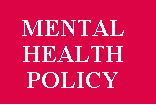
Reprinted from OpenMind (1998) 94 11
Threats & Promises
When legislation happens on the back of scaremongering about community care, we must be concerned about our civil rights, says Vivien Lindow
These are worrying times for those of us who have been detained under the Mental Health Act. Most survivors of psychiatry believe that properly constituted and fair legal proceedings can and should protect us from harming others; but at the moment the methods are, literally, 'overkill'. We have an equal right to be protected from being harmed by injurious aspects of the psychiatric system, some of which can actually be lethal.
The public has been persuaded that those of us who express reluctance about taking medication do so because of our madness. It is seldom said that it is rational not to want to take harmful substances that deliver an unacceptable quality of life to some, giving us the very illnesses that the NHS spends a fortune treating in other people. Unwanted effects include impairment of movement and sight, difficulty in thinking, unyielding sluggishness and impotence. People are expected to tolerate these permanently. That is, if the medication doesn't kill us. Neuroleptic malignant syndrome and unexpected deaths involving the cardiovascular system are two of the lethally adverse effects of major tranquillisers.
Essential to a new Mental Health Act would be the provision to us of truthful information about treatments, including ECT. There should be national standards of information, agreed between those who prescribe and those who receive treatment. Other essential safeguards would be a ban on prescribing in excess of British National Formulary safe dosages, and clear enforceable guidance on avoiding prescribing several drugs together. I am wholly opposed to any extension of compulsory treatment in the community: it would further hazard our health and increase our alienation from services.
One item of necessary reform under a new Act is to enable the person receiving treatment to nominate their 'nearest relative' (NR - this is the person who gives permission for us to be detained and compulsorily treated). Currently the NR is defined by the Mental Health Act, in a hierarchical list, so that the relative who comes top in the list becomes the NR, regardless of your personal relationship with them. This situation is redolent of historical abuse in the 'madhouse' and 'asylum' systems, which many families used to dispose of a troublesome member. Sometimes the parent or spouse nominated by the present Act is someone who has a long history of controlling us, or who is a major trigger of our distress, or even someone we hardly know. While a new Act may need to nominate a 'default' next of kin, part of the paperwork should be a legally valid means for a person to nominate their nearest relative. Among other benefits, this will help to end the discrimination against lesbians' and gay men's partners within the mental health system.
Whatever the new legal arrangements look like, one safeguard must be the statutory right for each person threatened with forcible detention and/or treatment to receive independent advocacy. If a person is beyond choosing, an 'on-call' system should bring an independent advocate to the scene. A worker should not be able to threaten sectioning (a common device to elicit compliance) without calling in such an advocate. Similar arrangements would bring in a legal advocate at the moment when assessment under the Act is decided upon, and during any other processes under the Act.
Lastly, a new Act gives an opportunity to stop the abuse of delivering electroconvulsive therapy (ECT) without consent. Many people are traumatised by ECT, even those who consent. There is now a wealth of human testimony to this, spanning decades. Some of us have spent the rest of our lives campaigning against it after suffering this barbaric 'treatment'. It is banned altogether in some countries. Time to join the twentieth century, before we reach the twenty-first.
Vivien Lindlow is a freelance consultant on mental health issues, and co-author of A Survivor's Guide to Working in Mental Health Services (Mind 1998).